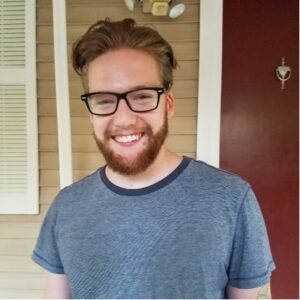Joshua Bumgarner

Education:
B.A. in Chemistry from Willamette University, Salem OR, 2017
From: Walla Walla WA
Joined David Lab: April 2018
Outside of lab: I like to go on hikes or spend time with my big goofy labradoodle. I’m also a big foodie who loves to try new restaurants and drinks
Research in David Lab:
BER glycosylases are usually highly specific in the type of damage they repair, and when they repair it. The NEIL family of glycosylases are unusual in their ability to work on a multitude of different DNA lesions, and can often do so in DNA contexts outside of canonical B-DNA. I work to understand what dictates when a NEIL enzyme repairs a lesion, and what influences when it when it does not. I have used a variety of different lesions to develop structure activity relationships between specific bases to better learn what structures of the base are required for recognition and repair, what which impair NEIL activity. In addition, most enzymatic assays are performed in dilute buffer systems, however this is not necessarily the case in a cell. The impact of the crowded environment of a cell, known as macromolecular crowding, can significantly impact enzymatic activity. I have been working to incorporate this into our enzyme assays and understand how it changes our understanding of the enzymes behavior between a test tube and the cellular environment.
Previous Research Experience:
I previously studied macromolecular crowding under Dr. Todd Silverstein at Willamette university, working to understand the influence of crowding agents on the pH profile of alcohol dehydrogenase, and how it altered the construction and pKa’s of the active site. I have also worked at the Hawaii Institute of Marine Biology studying the ability of coral to acclimate to increasing water temperatures over the past 40 years, and the inventible climb in ocean temperatures in the years to come.
